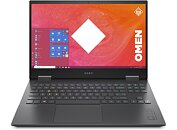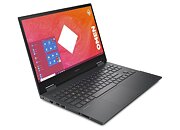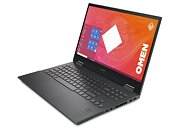Wednesday, April 29th 2020

HP Updates OMEN 15 Laptop Design, Now Features AMD Ryzen 7 4800H and GeForce RTX 2060
A refresh of HP's OMEN 15 seems to be about to hit the market, as HP UK has already put up a page for the revised laptop. The most appealing changes are, as usual, under the hood: the updated model now features AMD's Ryzen 7 4800H CPU, an 8-core, 16-thread solution that features a 45 W TDP and basically beats anything Intel has on the market against it. However, it seems that the scarcity of high-end mobile GPUs for any AMD-based platform continues, as the most powerful graphics solution available for this particular version of the OMEN is an NVIDIA RTX 2060 graphics card. Perhaps OEMs don't want to spoil us with both the best CPU and GPU solutions available on the mobile market? Go figure.
The OMEN 15 has seen a redesign from its previous version, now featuring thinner bezels, a different hinge system, no number pad, and the panel supports Adaptive Sync, though the refresh rate hasn't been detailed. It also features a Bang & Olufsen sound system, as well as RGB-backlit keys. The product page for the product has since been taken down and can now only be accessed via a cached version, so there's that. But the laptop was priced at 1,199 GBP (1,370 EUR).
Sources:
HP Cached Page, via Videocardz
The OMEN 15 has seen a redesign from its previous version, now featuring thinner bezels, a different hinge system, no number pad, and the panel supports Adaptive Sync, though the refresh rate hasn't been detailed. It also features a Bang & Olufsen sound system, as well as RGB-backlit keys. The product page for the product has since been taken down and can now only be accessed via a cached version, so there's that. But the laptop was priced at 1,199 GBP (1,370 EUR).
It's not just a gaming laptop, it's THE gaming laptop. Obviously, the OMEN 15 has a powerful AMD processor and NVIDIA graphics in a compact frame. Did we mention it has a fast display and long battery life? Yeah, it has everything and you can take it even further with OMEN Command Center. So, just enjoy those envious looks while you play, it's only natural.
Powerful in all the right places
The OMEN 15 is a perfect example of how there can never be too much of a good thing. With a powerful AMD processor and NVIDIA graphics cooled by OMEN Tempest Cooling, it makes you think how it all fits into such a tiny little package.
Beautiful doesn't begin to describe it
We don't need to tell you how good it looks and feels to play on, but we're going to do it anyway. It's easy on the eyes with a luscious design and fast display. Crafted with Audio by Bang & Olufsen and super long battery life, so that means you won't stop farming those wins or those admiring looks.
Now it's personal
The OMEN 15 doesn't just stop at having powerful specs and an amazing look. With OMEN Command Center, you can customize and optimize everything from performance controls to the customized keyboard. It's easy to upgrade and has all the ports you need, so you can take it even further beyond other mere gaming laptops.
HP



32 Comments on HP Updates OMEN 15 Laptop Design, Now Features AMD Ryzen 7 4800H and GeForce RTX 2060
Another alternative is that it takes one generation for laptop makers to catch up, like you suggest. When the first Ryzen U CPU's were launched, we didn't see many models with it, only a few with worse panels and high idle power consumption. A year later we saw more models with better parts and specs, and even MS bothered making a Ryzen version of their Surface Laptop (and that's not a given).
So maybe it'll take a generation for gaming laptops as well?
If that little grille on the right is all the cooling there is... :banghead: For comparison, the other Omens with 45W intel CPU have 2 scram jets, err, fans with a double heatpipes that run throught both the CPU and the dGPU, so one fan can help the other in case of need.
Also, the intel ones have 144Hz displays.
So, in summary - to this one seems like a waste of a good CPU. HP should have made a decent ZBook with it.
Specs wise, the 2060 seems a perfect match for the 4800H for professionals and creators. If you want better GPU, I'm sure there are, or will be, NV Quadro / AMD Radeon Pro laptops/desktop replacements. Gamers will still prefer Intel for their 2070 / 2080 equipped gaming laptops.
And this is probably the sweet spot of affordable gaming on the go.
Mobile rtx2060 is plenty powerful for any games out now.
When you're a multibillion-dollar company, and things aren't working right, you want to be able to pick up the phone and call someone from your partner company, and have them send a troubleshooting person or team to your front door by the next working day. Intel and NVIDIA have this support available, AMD does not.
A personal anecdote to illustrate: my team worked on a software project where we had to interface an Android device with another proprietary hardware device. The latter used a controller chip by a well-known and established manufacturer, who had provided an Android driver for that chip, which means we didn't have to write our own driver. That shaved literally months off the development time.
However, the controller driver had some rather severe bugs. But because the manufacturer of that controller provides easily-contactable support, I was able to get in touch with a real engineer at the manufacturer, explain the problem to them, and send them crash logs of the bugs. Two weeks later, they provided me a beta driver that addressed the issues, and my team was able to get back to actually writing the software we were supposed to be writing, and deliver it on-time and on-budget.
If a less-well-supported controller chip from a less-well-known manufacturer had been used, it's quite possible - in fact likely - that my project would not have been able to meet its deadlines. This of course, does not mean that an off-brand controller chip would have objectively been worse - it's quite possible that the opposite would have been true. But there was no way to know, and no time to perform that investigation. In contrast, we were very aware that the manufacturer of the chip chosen was renowned for its good support - it was a known quantity on a project that had many unknowns.
At the end of the day, the choice of controller chip ensured that my team's software project, worth a few hundred thousand dollars, succeeded. When you are designing laptops, you're talking hundreds of millions. Those are projects that hurt big if they fail, they are projects that pretty much can't fail. And the best way to ensure success is to stick to what you know.
Right now, Intel and NVIDIA are known successful quantities, and AMD is not. It takes a lot of time, a lot of expenditure, and a lot of dedication to build up proven world-class support, and AMD simply isn't there yet. If they continue to iterate as well as they are, there's absolutely no question they'll get there - but they are starting from scratch against competitors who have been doing this for literally decades.
You seem to be quite clueless about these things, based on your comments.
Its a theme with AMD products. GPUs are the same... Nvidia releases mobile friendly versions and has a tight driver regime, AMD is winging it (look at the pre-launch 14Gbps driver for Navi...) and has no consistency in releases. And look at Ryzen. The mobo / RAM compatibility issues. Yes, its a new platform, but that's not an excuse, it is an observation and it counts.
But we are asking why one could slap 2060 into AMD laptop, but not something faster.
Or how adding better screens to AMD offerings is more complex than having crappy TNs or worst of the IPS on them.
HP cannot add 144Hz laptop to AMD lineup, while tiny MSI can, how convincing.
Or why there still isn't a goddamn Spectre based on Renoir.
Just to put this in perspective, my laptop is a PowerSpec 1510 i7-7700HQ, 16GB DDR4-2400 RAM, 256 Samsung EVO 960 M.2 + 1TB WD Blue SATA SSD and GTX 1070 w/8GB.
This has a PCMark 10 overall score of 4689 which is better than about 75% of submissions with this same CPU.
I'm looking at their list of 4800H laptops, and the #1 laptop is an Asus Tuf with 16GB RAM, 512GB SSD, and a 1660Ti
It has a score of 5560. This is only 18.6% faster than my 2 1/2 year old laptop with a quad core i7-7700HQ.
To put this into perspective, the top laptop score for an i7-9750H with a 1660Ti is almost 5966 (27% faster). Bumping up to a 2070 will push that to as high as 6458 (37% faster). To add insult to injury here, the 9570H based laptops are being discounted to make room for the 107xx and 108xx laptops while the AMD laptops are charging a premium. Not talking chump change either, in some cases you'll pay 40-50% more for the amd based laptops.
Yes this probably has nothing to do with the CPU, it's just cheap parts and lack of optimization. Possibly there's something up with the chipset as well.
But from a consumer standpoint, I don't care. It's like telling me your new car has a powerful motor but skinny tires and a 3 speed transmission on it.